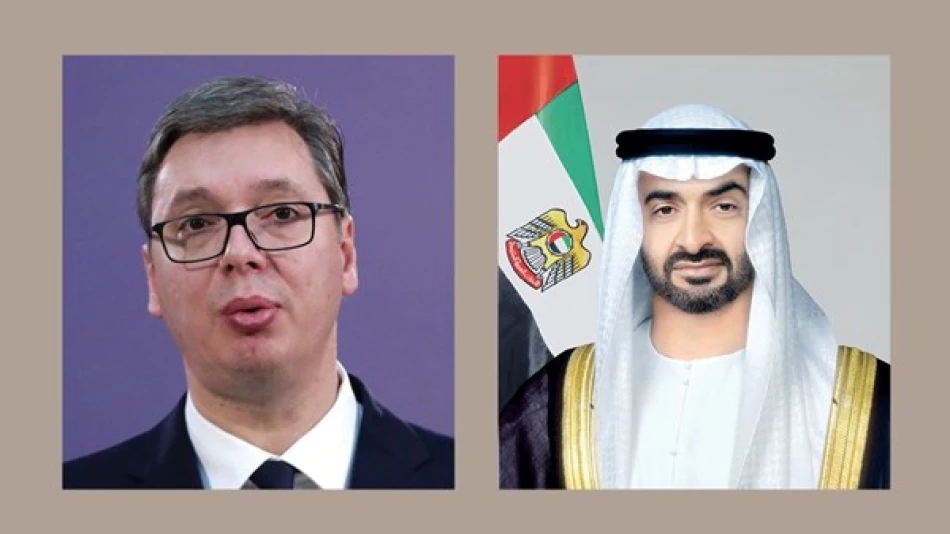
UAE President, Serbian Counterpart Discuss Strengthening Comprehensive Strategic Partnership
UAE-Serbia Strategic Partnership Deepens as Leaders Target Balkan Investment Opportunities
UAE President Sheikh Mohammed bin Zayed Al Nahyan concluded a high-level working visit to Serbia, reinforcing the comprehensive strategic partnership between the two nations with particular focus on investment, technology, and renewable energy cooperation. The meeting with Serbian President Aleksandar Vučić signals the UAE's growing interest in Balkan markets as part of its broader economic diversification strategy.
Economic Diversification Drives UAE's Balkan Push
The discussions centered on expanding bilateral cooperation across multiple sectors, including investment, trade, technology, food security, and renewable energy. This comprehensive approach reflects the UAE's systematic strategy of building diverse economic partnerships beyond traditional Gulf allies, particularly as global supply chains face ongoing disruption.
The timing of this engagement is significant. As European nations seek to reduce energy dependence on Russia following the Ukraine conflict, the UAE's expertise in renewable energy and its substantial sovereign wealth resources position it as an attractive partner for Balkan countries pursuing energy transition.
Strategic Positioning in European Markets
Serbia's unique position as a non-EU member maintaining relationships with both Western and Eastern powers makes it an appealing gateway for UAE investments into European markets. Unlike EU member states, Serbia offers more flexible regulatory frameworks while still providing access to European supply chains and markets.
The comprehensive economic partnership agreement between the two countries, referenced during the talks, creates a framework for preferential trade terms that could benefit UAE businesses seeking European market entry without navigating complex EU regulations.
High-Level Delegation Signals Serious Investment Intent
The composition of the UAE delegation reveals the breadth of sectors under consideration. The presence of Dr. Sultan Al Jaber, Minister of Industry and Advanced Technology, alongside Mohamed Alabbar, Chairman of Eagle Hills, suggests both government-backed infrastructure projects and private real estate development are on the agenda.
Eagle Hills' involvement is particularly noteworthy, given the company's track record of large-scale urban development projects in emerging markets. This could indicate potential major real estate and hospitality investments in Serbian cities, following the model successfully implemented in countries like Jordan and Nigeria.
Technology and Food Security Focus
The emphasis on technology cooperation and food security reflects current global priorities. The UAE's advanced agricultural technology, developed to address domestic food security challenges in an arid climate, could find applications in Serbia's agricultural sector, potentially improving productivity and export capabilities.
This technological exchange represents a departure from traditional resource-based partnerships, positioning both countries to benefit from knowledge transfer and innovation collaboration.
Regional Stability as Economic Foundation
Sheikh Mohammed bin Zayed's emphasis on dialogue and diplomatic solutions for regional conflicts underscores the UAE's approach to investment partnerships. The country has consistently prioritized stability as a prerequisite for long-term economic engagement, viewing political risk mitigation as essential for protecting substantial overseas investments.
The UAE's stated commitment to supporting peace and stability in the Balkans suggests a long-term strategic interest in the region, potentially extending beyond Serbia to other Balkan nations seeking similar partnerships.
Market Implications and Future Outlook
This partnership represents a broader trend of Gulf states diversifying their international economic relationships beyond traditional Western and regional partners. For investors, UAE-Serbia cooperation could create opportunities in infrastructure development, technology transfer, and energy projects.
The success of this partnership may serve as a template for similar agreements with other Balkan nations, potentially establishing the UAE as a significant economic player in Southeastern Europe. Given the region's strategic location between Europe, Asia, and the Middle East, such partnerships could prove increasingly valuable as global trade routes continue to evolve.
The emphasis on sustainable development partnerships suggests both countries are positioning themselves for long-term economic transformation rather than short-term transactional relationships, indicating potential for substantial future investment flows and technological collaboration.
Most Viewed News

 Layla Al Mansoori
Layla Al Mansoori






